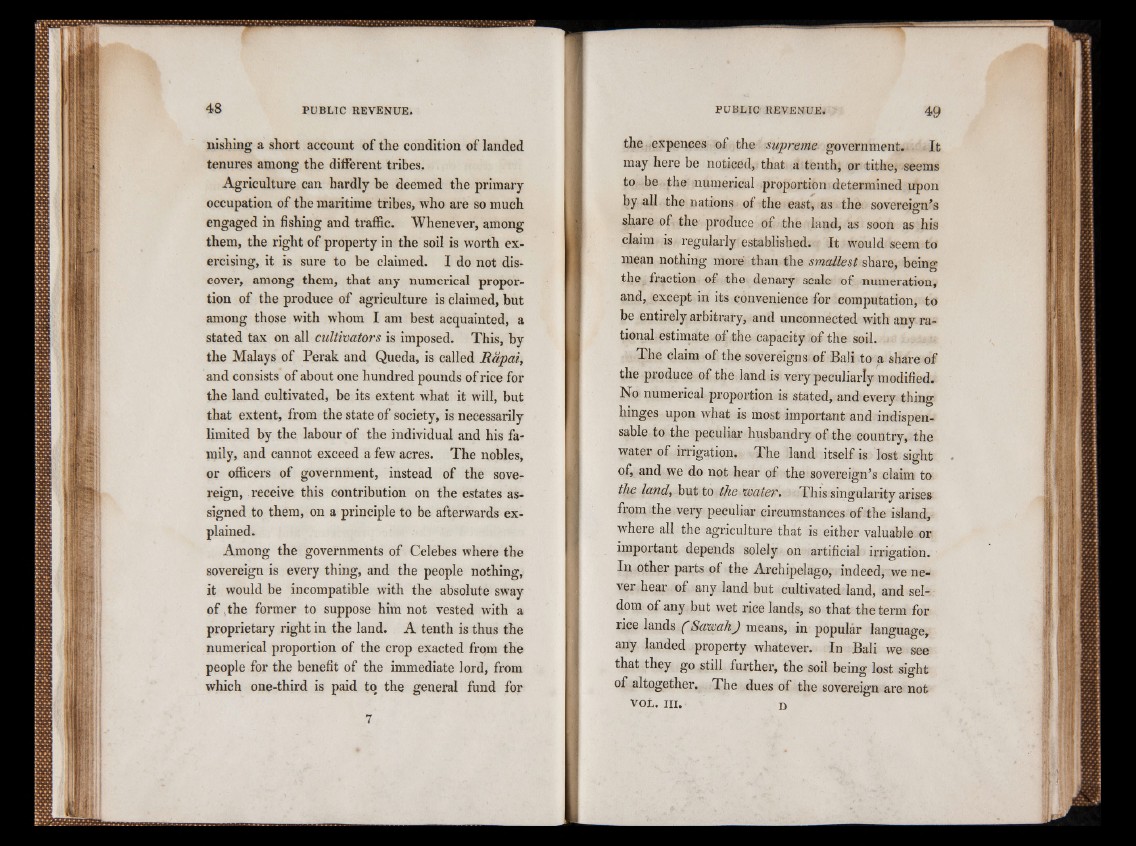
nishing a short account of the condition of landed
tenures among the different tribes.
Agriculture can hardly be deemed the primary
occupation of the maritime tribes, who are so much
engaged in fishing and traffic. Whenever, among
them, the right of property in the soil is worth exercising,
it is sure to be claimed. I do not discover,
among them, that any numerical proportion
of the produce of agriculture is claimed, but
among those with whom I am best acquainted, a
stated tax on all cultivators is imposed. This, by
the Malays of Perak and Queda, is called Râpai,
and consists of about one hundred pounds of rice for
the land cultivated, be its extent what it will, but
that extent, from the state of society, is necessarily
limited by the labour of the individual and his family,
and cannot exceed a few acres. The nobles,
or officers of government, instead of the sovereign,
receive this contribution on the estates assigned
to them, on a principle to be afterwards explained.
Among the governments of Celebes where the
sovereign is every thing, and the people nothing,
it would be incompatible with the absolute sway
of ,the former to suppose him not vested with a
proprietary right in the land. A tenth is thus the
numerical proportion of the crop exacted frqm the
people for the benefit of the immediate lord, from
which one-third is paid to the general fund for
the expences of the supreme government. It
may here be noticed, that a tenth, or tithe, seems
to be the numerical proportion determined upon
by all the nations of the east, as the sovereign’s
share of the produce of the land, as soon as his
claim is regularly established. It would seem to
mean nothing more than the smallest share, being
the fraction of the denary scale of numeration,
and, except in its convenience for computation, to
be entirely arbitrary, and unconnected with any rational
estimate of the capacity of the soil, p
The claim of the sovereigns of Bali to a share of
the produce of the land is very peculiarly modified.
No numerical proportion is stated, and every thing
hinges upon what is most important and indispensable
to the peculiar husbandry of the country, the
water of irrigation. The land itself is lost sight
of, and we do not hear of the sovereign’s claim to
the land, but to the water. This singularity arises
from the very peculiar circumstances of the island,
where all the agriculture that is either valuable or
important depends solely on artificial irrigation.
In other parts of the Archipelago, indeed, we never
hear of any land but cultivated land, and seldom
of any but wet rice lands, so that the term for
rice lands ( SawahJ means, in popular language,
any landed property whatever. In Bali we see
that they go still further, the soil being lost sight
of altogether. The dues of the sovereign are not
vol. III. d